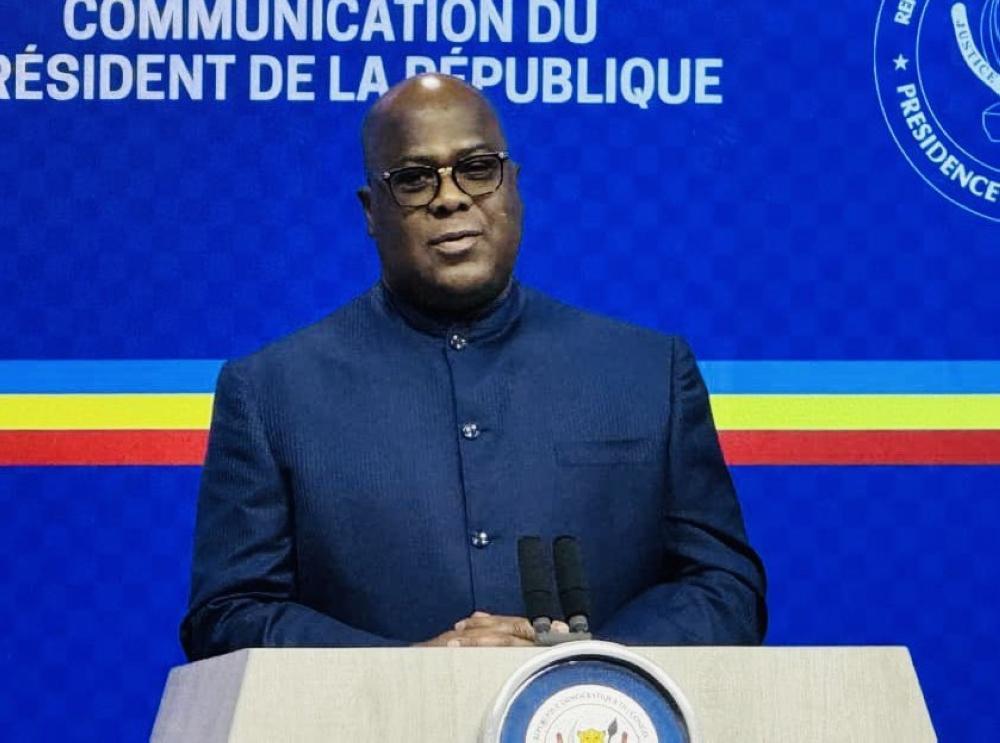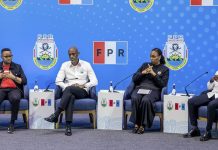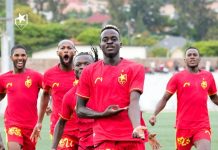Africa-Press – Rwanda. Following weeks of mounting pressure to return to peace efforts, DR Congo’s President Felix Tshisekedi has backpedaled from the war rhetoric he whipped up in the lead-up to his re-election in 2023.
He said “observing peace [is] a wiser attitude.”
Tshisekedi, who accuses Rwanda of supporting the M23 rebels in eastern DR Congo, had said he would declare war on his country’s neighbour.
Rwanda, which dismisses the allegations, condemned Tshisekedi’s regime change rhetoric and said his government had abandoned regional peace initiatives in pursuit of military operations that cannot solve the crisis in eastern DR Congo.
“I want to give peace a chance,” he said at a press conference in the capital Kinshasa on Thursday, February 22.
The African Union, the United Nations, the United States government, which acts as a mediator between Rwanda and DR Congo, had earlier called on the two countries to prioritise dialogue, and resolve the conflict through the Luanda and Nairobi peace processes.
“The context in which we find ourselves does not allow us to put into practice what I had said. Not because I can’t or don’t want to, but because there are enough initiatives that make observing peace a wiser attitude,” Tshisekedi said.
Tshisekedi said South Sudan’s President and Chairperson of the East African Community (EAC) Salva Kiir would visit DR Congo as part of the efforts to re-energise regional peace mechanisms. Kiir, who met Rwanda’s President Paul Kagame on Thursday, is also expected in Burundi, which backs the Congolese government coalition fighting the M23.
Rwanda’s concern
The Rwandan government accuses the Congolese armed forces of integrating the FDLR, a UN-sanctioned militia linked to the 1994 Genocide against the Tutsi in Rwanda.
Rwandan ambassador to the UN Ernest Rwamucyo told the Security Council on Tuesday that DR Congo’s support to the FDLR was a “state policy” which posed a “very serious threat to Rwanda’s security and territorial integrity.”
Rwamucyo said “any force that directly or indirectly collaborates and supports the genocidal FDLR is considered belligerent to Rwanda.”
The Rwandophone question
As he urged the international community to address the root causes of the conflict, Rwamucyo reiterated the position of the Rwandan government that the crisis in eastern DR Congo was a result of decades-long persecution of Kinyarwanda-speaking Congolese communities (also known as Rwandophones, who have been their citizenship rights.
He cautioned that with “continued military build-up,” near the Rwandan border, the Congolese government sought to “expel the M23 and in general the Kinyarwanda-speaking Congolese civilian population,” from DR Congo’s territory into refugee camps in the region.
Rwanda hosts up to 100,000 Congolese refugees, who have fled conflict since the late 1990s. More than 13,000 of them fled the recent conflict between a government-led coalition and the M23 rebel group.
Hundreds of thousands more refugees are hosted in Uganda, Burundi and Kenya.
Since early February, the M23 rebels have advanced towards Goma, the capital of DR Congo’s North Kivu Province, raising fears that they might take control of the city of an estimated two million people.
The recent escalation in hostilities in eastern DR Congo began in January following the expulsion of an East African Community regional force that had been deployed to observe a ceasefire and the rebels withdrawal.
The regional force withdrew its troops in December after the Congolese government refused to renew its mandate, a development that was seen as a frustration to regional peace efforts.
In mid-December, Tshisekedi’s government welcomed a military force from the Southern African Development Community (SADC), raising concerns that the conflict might plunge the region into a wider crisis.
Eastern DR Congo has been volatile for nearly 30 years.
The provinces of South Kivu, North Kivu and Ituri are home to more than 130 armed groups that are accused of atrocities and human rights violations. Multiple regional and international interventions have failed to end decades of insecurity.
For More News And Analysis About Rwanda Follow Africa-Press






